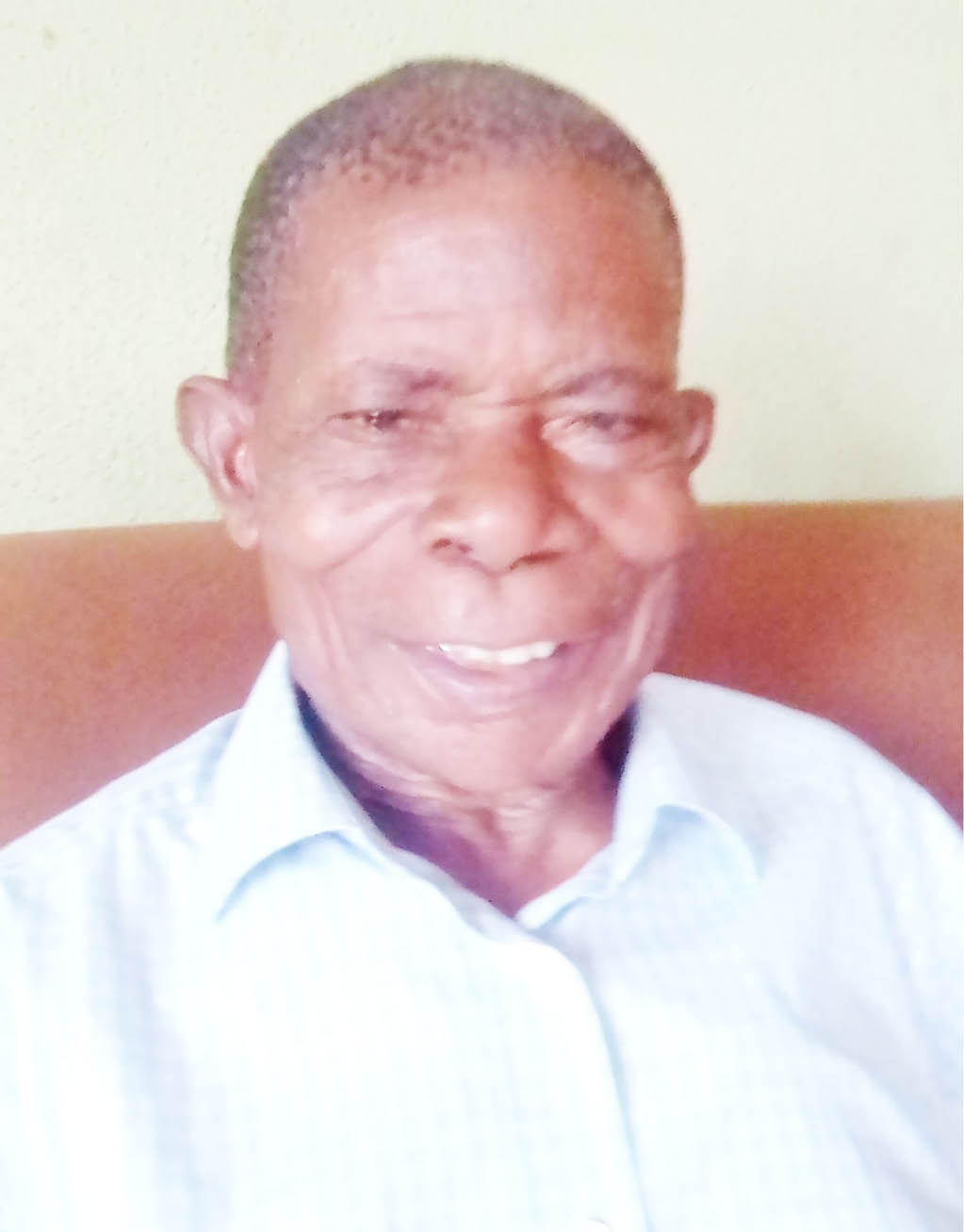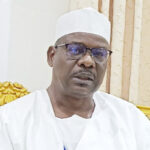Colonel Afaha Asam Nsudo (retd), who fought on the side of Biafra during the civil war in Nigeria, was born on July 27, 1942, at Ukwo in Esit Eket Local Government Area of Akwa Ibom State. In this interview he shared his experiences during the war, why he joined the army, and many other interesting issues.
How would you describe your early years in life?
In my time, growing up was very ordinary. The school was the ideal place where you met your mates, interact and play football together, which we were told was good for people wishing to become soldiers.
I was a prefect in the school, and I remember I was always cautioned not to use military method to punish offending or indiscipline students. I was seen as being too strict and straightforward, according to the white men who taught in the school. I was also the shot-put champion for seven years. This record was not broken till I left school. I was also running for the school. I love sports generally. That was the routine.
Which schools did you attend?
Because I was what was popularly called a ‘teacher’s boy’, I attended several schools. My father was a teacher and later became a court clerk. After some time, I was taken out of the Eket environment by my uncle, who was a Salvation Army teacher. He took me from my village, Ido Urua.

I started school in Afaha Atai Group School. That was at a very early age. This was before my uncle (now late) took me with him to Etinan Division, where I attended the Salvation Army Elementary School. We kept being posted from one school to another.
I was taken to a place called Ikot Ebok, Ikot Nte Primary School, together with my uncle. From there, we left to Akai Eket, where I attended a secondary school in the same location, a big place, behind the primary school. I also attended other military higher schools and war courses abroad.
While growing up, were there signs that you would join the military?
At a very young age, everybody seemed to know that I was on my way to becoming a soldier; that was why most people called me army man, or perhaps because of my behaviour.
I took an examination to join the Nigerian Army at quite a young age. When I went for the examination, I saw grown up people who said they had been taking the exams but were determined to succeed as they had become familiar with what questions were normally asked.
The exam was a little more than ordinary because even merely looking at you if they saw signs of an insolent person, they would drop you.
It was in Enugu that all the candidates from the Eastern Region were assembled for the exam. I was always called a small army boy, but I was the type they wanted because I would spend longer time in service.
They tried to entice me into the air force to become a young fighter pilot, but I insisted I wanted to join the army. Incidentally, I had an uncle, my father’s younger brother, Jonah, who was in the army too. He fought during the Second World War. He was in Burma and Egypt. He later died in Ibadan.
From Enugu, we were taken to Lagos, where, for the first time, medicals were carried out. That was where I saw big equipment and senior officers wearing the redneck collar army uniform. All that frightened me quite a lot. That was where all the interviews were done. I was told I was one of those who qualified.
Why did you become interested in the army?
I was too engrossed in literature, reading about Napoleon, the war general, and all such literatures. And I would get angry sometimes when I read or heard people say that Napoleon was defeated in war. Reading about Hannibal, even the Greek mythodology, I always thought I should be like one of them. I got the feeling that I would become a soldier someday. I never liked the idea of being defeated or such stories told about people who were quite good. I had admired such people a lot, from ancient time to the present. So I decided that I would love to belong there. That was how it all started.
When you joined the army, which unit were you posted to?
Immediately I came back from the MONS officers’ cadets school in UK, I was posted to the 3rd Battalion of the Nigerian Army, Kawo, Kaduna. There were only five battalions then. The likes of General T.Y Danjuma and Brigadier-General Samuel Ogbemudia were my seniors. In fact, Danjuma was the one who came to the airport to receive us and take us to the barracks. Ogbemudia was my first company commander. I belonged to the A Company, first infantry company. It was quite a good unit, commanded by a white man, Colonel W. W. Hedges. That was in 1963. Another tall, huge white officer, Major Greystone, was also in the company. I also remember that General Alex Madiebo was a major when I came in. He was a headquarters company commander. He later became a Biafran army commander. I understand he is now in Lagos. He is still alive. I understand he lost one of his legs to diabetes.
Would you like to share your experiences during the civil war?
We did not think of civil war at all. We suddenly saw ourselves in a division. Those of us from the eastern side were imprisoned for protection, according to them. That was their claim. After some negotiations by the authorities, those from the East, up to Benin, apart from those from the western part of the country, were evacuated to the East in safety, while those from the North were similarly sent back to Kaduna through the railway, in a peaceful fashion. That was how we found ourselves in the open divide of the war.
We were the youngest officers and were not involved in the coup in any way. We did not know anything about it at all. But we suddenly found ourselves on the side of Biafra and our friends and colleagues, whom we had all become more like brothers, saw themselves on the Nigerian side.
When the civil war broke out, we were sent mainly to the Nsukka sector, from where we moved to many other sectors, including Onitsha. I think that was where people heard more about us.
Many people recall the civil war in literatures, but I would say that many of such recollections do not reflect the actual history. For instance, I think the story that I was brave is just rubbish. Let us say that I was just a survivor of that war, not because one was very brave or had some personal behaviours when under severe danger.
I remember that in Onitsha, when there were excessive shelling by both forces for over 24 hours (when the bridge was brought down), I would say there was some spiritual guidance. Many times during the war, I would stay in a place and a voice would tell me, ‘Leave this place.’ And when I did, that place would be bombed soon after and other soldiers would be killed or wounded. I think that was how I came to be seen as being brave by the 18 Battalion, which I commanded.
One of the drawbacks of the war was that soldiers were not given time to train adequately. So the little experience I got seemed to make me better than others who did not have the opportunity to be trained at all. It was not an easy one. But by God’s grace, we managed. In fact, it was when we stopped the federal forces from crossing into Onitsha that I was promoted a lieutenant colonel.
Who were your contemporaries during the war?
The present head of state, Muhammadu Buhari, is one of my contemporaries. He is my mate. Few others you may know are Admiral Elegbede of the Nigerian Navy, Major-General Duro Ajayi of the Army Engineers, the late President Yar’adua’s elder brother, Major-General Alfa, Shelleng. They all fought during the war.

After the war, you were appointed a defence attaché, why were you sent to East Africa?
I was a deputy defence attaché. There was an air force man who was ahead of me. We were sent to East Africa, but we were in charge of Kenya, Tanzania, Uganda, up to the Island of Seychelles. We also covered Somalia when Siad Barre was the president. We knew that after Barre, that country was not going to have unity as a country. We were quite aware of the problems they are having now. We wrote to the Nigerian government about them.
Don’t forget that Nigeria actually put up that contraption to look after the many South Africans who had fled their country during the apartheid era to those countries, especially Tanzania, where the South African fugitives took refuge. That was how the Nigerian government was able to assist them without necessarily going directly into South Africa during those heady apartheid days. That was the main idea.
While you were in the army, which significant offices did you hold?
As an officer, I started as a platoon commander, then company commander, up to battalion and acting brigade commander. I held another important and sensitive military office called Colonel General Staff (CGS) in the army headquarters in Lagos. That was under the late military head of state, General Sani Abacha as chief of army staff. Abacha and I had served in the same unit previously in 3rd Battalion, with Bob Akoni. Abacha and I were very friendly. We understood each other more. Even General Danjuma knew us very well because we played tennis, ate, ran, trained and walked together. We were not married because the army wanted young officers to be married first to the army before the actual marriage to our heartthrobs.
How has life treated you at 78 plus?
As an old man now, I thank God for keeping me alive, though it is not very easy. But I believe in God absolutely because without him I know that people like me would not be alive today. I live a normal life. I have never taken alcohol, soft drink, or smoked cigarrette, even when I was a young officer.
God made me the way I am. My late father was known as king of the boys. Name any drink and you would find it in my father’s house. But I have been the odd one. Because I was not given to drinking, I used to be fined bottles of whisky whenever the officers met. They would say I had insulted the commanding officer by not drinking beer or spirit. I would always toast to the Queen with water. During my time as president of the Officers’ Mess, I would toast with water, but would pay a fine of whisky or brandy. And I would pay happily because it was all taken as a joke. Everybody realised that it was a reality.
I take life very easy and enjoy myself with my family.
Do you have major regrets in life?
My major regret is the Nigerian civil war because it disturbed my life from going as it should have been. The war suddenly divided friends. Colleagues began to see one another as foes. We became biased. We fought against ourselves – people who slept together, ate together, played tennis together, did everything in common. My God! That’s my greatest regret.
Would you say the war was necessary?
Well, I think it was necessary to bring out the bad and the good in the society and to make Nigeria grow from a false sense of security. Remember that people went and killed their friends, even before the war broke out. I did not know that the bias was so deep. I know that there were officers who went and killed other officers because they came from a certain ethnic group.
The first arrest I experienced was that I was a straightforward officer, and that I was strict with everybody. That was probably what saved me from being killed by another group of people.
My eyes were opened to realise that people were having deep grudges over ethnicity. I do not believe in tribalism.
What legacies would you like to be remembered for?
For being myself and not attempting to be like anybody else. Whatever comes to you should be taken as what God intends for you. I know of some very senior officers who said they took me as their role model. I don’t know why they did that, but they said it was because I was myself. They were my juniors who later became my seniors, yet they still took me as their role model because they said I was straightforward with everybody.
I do not have time to discriminate between one person or another, or one tribe against another.
You are now a bishop; do you think soldiers can be better priests?
Yes! I think they are. Soldiers that have seen hell will be better missionaries than others because they have seen the dark side of life and all kinds of people. They are in a better position to talk about the potency and mysterious nature of God.
You are a vegetarian and teetotaler; why?
We have been cautioned against killing and eating animals, for many reasons. When we kill and eat animals they see us as their enemies. That is the reason they attack man. As a spiritual man, I have been taught that the best foods for man are herbs and seeds. That way, man would live longer and be free from the many sicknesses that afflict him. Too many of these diseases are caused by eating assorted meats. I have seen that since becoming a vegetarian over 20 years ago, I have hardly been sick. Drinking water also helps me much. This way too, the ailments associated with alcoholic drinks are distant from me. My life has been very simple. No sickness has taken me to hospital.
As a retired senior military officer, you cook your foods and do your laundry; why?
I regret that my wife, who used to cook for me (although she was not a vegetarian), is no longer alive. Those that stay with me now may not quite handle my types of food; they cannot cook vegetarian meals. Therefore, I have to do them my own way. Doing my own laundry keeps me busy as well. It makes me lively, as well as my regular exercises. They keep me more lively than my next door neighbours. I love doing my laundry most times. It does not make me less a retired army officer.
Tell us about your family. When were you married? How many children do you have?
I was married in 1968 to Effanga Nsudo. We had six children, but my eldest daughter died. Five are alive. They are three boys and two girls – all grown up now and scattered all over the place. I am now the most senior person alive in the Nsudo family.
What is your advice to the country?
My candid advice to the country is that all Nigerians must love one another and forgive. No matter the language and status one finds oneself, love and forgiveness must be paramount. If God does not give promotion, nothing works. We must pay attention to the less privileged. That is my advice to my contemporaries and those coming after us.

 Join Daily Trust WhatsApp Community For Quick Access To News and Happenings Around You.
Join Daily Trust WhatsApp Community For Quick Access To News and Happenings Around You.


